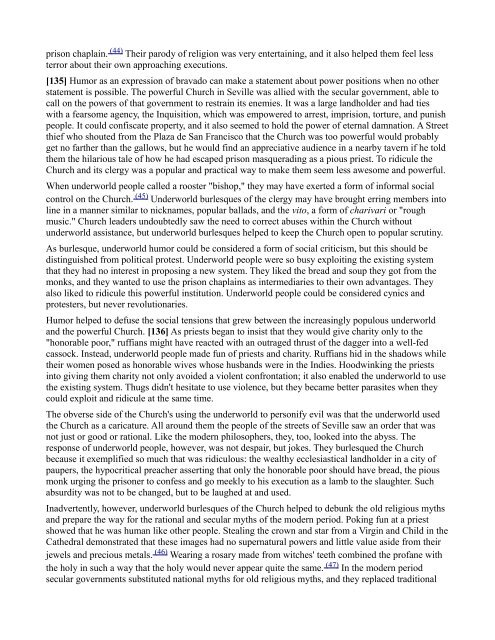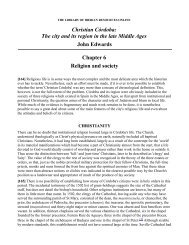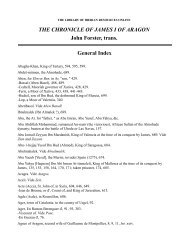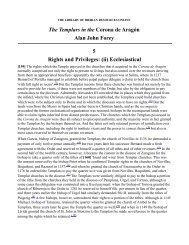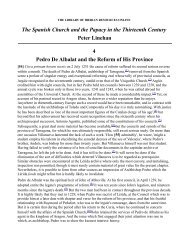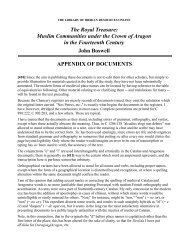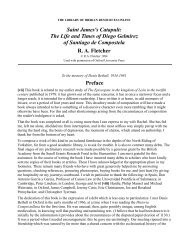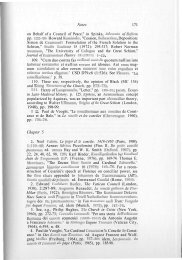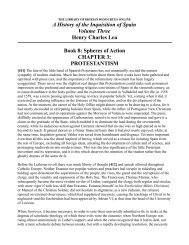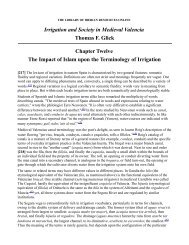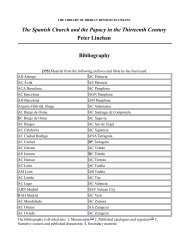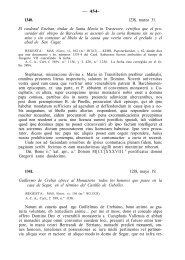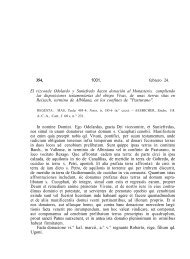Chapter 6 - The Library of Iberian Resources Online
Chapter 6 - The Library of Iberian Resources Online
Chapter 6 - The Library of Iberian Resources Online
Create successful ePaper yourself
Turn your PDF publications into a flip-book with our unique Google optimized e-Paper software.
prison chaplain. (44) <strong>The</strong>ir parody <strong>of</strong> religion was very entertaining, and it also helped them feel less<br />
terror about their own approaching executions.<br />
[135] Humor as an expression <strong>of</strong> bravado can make a statement about power positions when no other<br />
statement is possible. <strong>The</strong> powerful Church in Seville was allied with the secular government, able to<br />
call on the powers <strong>of</strong> that government to restrain its enemies. It was a large landholder and had ties<br />
with a fearsome agency, the Inquisition, which was empowered to arrest, imprision, torture, and punish<br />
people. It could confiscate property, and it also seemed to hold the power <strong>of</strong> eternal damnation. A Street<br />
thief who shouted from the Plaza de San Francisco that the Church was too powerful would probably<br />
get no farther than the gallows, but he would find an appreciative audience in a nearby tavern if he told<br />
them the hilarious tale <strong>of</strong> how he had escaped prison masquerading as a pious priest. To ridicule the<br />
Church and its clergy was a popular and practical way to make them seem less awesome and powerful.<br />
When underworld people called a rooster "bishop," they may have exerted a form <strong>of</strong> informal social<br />
control on the Church. (45) Underworld burlesques <strong>of</strong> the clergy may have brought erring members into<br />
line in a manner similar to nicknames, popular ballads, and the vito, a form <strong>of</strong> charivari or "rough<br />
music." Church leaders undoubtedly saw the need to correct abuses within the Church without<br />
underworld assistance, but underworld burlesques helped to keep the Church open to popular scrutiny.<br />
As burlesque, underworld humor could be considered a form <strong>of</strong> social criticism, but this should be<br />
distinguished from political protest. Underworld people were so busy exploiting the existing system<br />
that they had no interest in proposing a new system. <strong>The</strong>y liked the bread and soup they got from the<br />
monks, and they wanted to use the prison chaplains as intermediaries to their own advantages. <strong>The</strong>y<br />
also liked to ridicule this powerful institution. Underworld people could be considered cynics and<br />
protesters, but never revolutionaries.<br />
Humor helped to defuse the social tensions that grew between the increasingly populous underworld<br />
and the powerful Church. [136] As priests began to insist that they would give charity only to the<br />
"honorable poor," ruffians might have reacted with an outraged thrust <strong>of</strong> the dagger into a well-fed<br />
cassock. Instead, underworld people made fun <strong>of</strong> priests and charity. Ruffians hid in the shadows while<br />
their women posed as honorable wives whose husbands were in the Indies. Hoodwinking the priests<br />
into giving them charity not only avoided a violent confrontation; it also enabled the underworld to use<br />
the existing system. Thugs didn't hesitate to use violence, but they became better parasites when they<br />
could exploit and ridicule at the same time.<br />
<strong>The</strong> obverse side <strong>of</strong> the Church's using the underworld to personify evil was that the underworld used<br />
the Church as a caricature. All around them the people <strong>of</strong> the streets <strong>of</strong> Seville saw an order that was<br />
not just or good or rational. Like the modern philosophers, they, too, looked into the abyss. <strong>The</strong><br />
response <strong>of</strong> underworld people, however, was not despair, but jokes. <strong>The</strong>y burlesqued the Church<br />
because it exemplified so much that was ridiculous: the wealthy ecclesiastical landholder in a city <strong>of</strong><br />
paupers, the hypocritical preacher asserting that only the honorable poor should have bread, the pious<br />
monk urging the prisoner to confess and go meekly to his execution as a lamb to the slaughter. Such<br />
absurdity was not to be changed, but to be laughed at and used.<br />
Inadvertently, however, underworld burlesques <strong>of</strong> the Church helped to debunk the old religious myths<br />
and prepare the way for the rational and secular myths <strong>of</strong> the modern period. Poking fun at a priest<br />
showed that he was human like other people. Stealing the crown and star from a Virgin and Child in the<br />
Cathedral demonstrated that these images had no supernatural powers and little value aside from their<br />
jewels and precious metals. (46) Wearing a rosary made from witches' teeth combined the pr<strong>of</strong>ane with<br />
the holy in such a way that the holy would never appear quite the same. (47) In the modern period<br />
secular governments substituted national myths for old religious myths, and they replaced traditional


